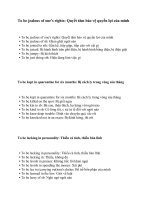Tiếng anh oxford 4 pptx
Bạn đang xem bản rút gọn của tài liệu. Xem và tải ngay bản đầy đủ của tài liệu tại đây (61.21 KB, 11 trang )
one of the (singular)
ONE OF THE (SINGULAR)
In phrases like “pistachio is one of the few flavors that appeals to me,” use the singular form for the
verb “appeals” because its subject is “one,” not “flavors.”
List of errors
file:///C|/Temp/livres/commonerrors/errors/oneofthe.html03/09/2005 15:39:08
one-dimensional
ONE-DIMENSIONAL
TWO-DIMENSIONAL
Once upon a time most folks knew that “three-dimensional” characters or ideas were rounded, fleshed out, and complex and “two-dimensional” ones
were flat and uninteresting. It seems that the knowledge of basic geometry has declined in recent years, because today we hear uninteresting characters
and ideas described as “one-dimensional.” According to Euclid, no object can be one-dimensional (of course, according to modern physics, even two-
dimensionality is only an abstract concept). If you are still bothered by the notion that two dimensions are one too many, just use “flat.”
List of errors
file:///C|/Temp/livres/commonerrors/errors/one.html03/09/2005 15:39:08
one in the same
ONE IN THE SAME
ONE AND THE SAME
The old expression “they are one and the same” is now often mangled into the roughly phonetic equivalent “one in the same.” The use of “one” here to
mean “identical with each other” is familiar from phrases like “Jane and John act as one.” They are one; they are the same.
List of errors
file:///C|/Temp/livres/commonerrors/errors/oneinsame.html03/09/2005 15:39:08
one of the only
ONE OF THE ONLY
ONE OF THE FEW
“Only” has its root in “one,” as should be obvious from looking at it. But we lose sight of this because of phrases like “only a few” and “only some,”
which lead in turn to the mistaken “one of the only.” “The only” always refers to just one item, so the correct expression is “one of the few.” Compare
this with the similarly mistaken “very unique.”
List of errors
file:///C|/Temp/livres/commonerrors/errors/only.html03/09/2005 15:39:08
only
ONLY
Writers often inadvertently create confusion by placing “only” incorrectly in a sentence. It should go
immediately before the word or phrase it modifies. “I lost my only shirt” means that I had but one to
begin with. “I lost only my shirt” means I didn’t lose anything else. “Only I lost my shirt” means that
I was the only person in my group to lose a shirt. Strictly speaking, “I only lost my shirt” should
mean I didn’t destroy it or have it stolen—I just lost it; but in common speech this is usually
understood as being identical with “I lost only my shirt.” Scrutinize your uses of “only” to make sure
you are not creating unwanted ambiguities.
List of errors
file:///C|/Temp/livres/commonerrors/errors/only2.html03/09/2005 15:39:09
onto/on to
ONTO/ON TO
“Onto” and “on to” are often interchangeable, but not always. Consider the effect created by wrongly
using “onto” in the following sentence when “on to” is meant: “We’re having hors d’oeuvres in the
garden, and for dinner moving onto the house.” If the “on” is part of an expression like “moving on”
it can’t be shoved together with a “to” that just happens to follow it.
List of errors
file:///C|/Temp/livres/commonerrors/errors/onto.html03/09/2005 15:39:09
oppress/repress
OPPRESS/REPRESS
Dictators commonly oppress their citizens and repress dissent, but these words don’t mean exactly
the same thing. “Repress” just means "keep under control.” Sometimes repression is a good thing:
“During the job interview, repress the temptation to tell Mr. Brown that he has toilet paper stuck to
his shoe.” Oppression is always bad, and implies serious persecution.
List of errors
file:///C|/Temp/livres/commonerrors/errors/oppress.html03/09/2005 15:39:09
oral/verbal
ORAL/VERBAL
Some people insist that “verbal” refers to anything expressed in words, whether written or spoken, while “oral” refers exclusively to speech; but in
common usage “verbal” has become widely accepted for the latter meaning. However, in legal contexts, an unwritten agreement is still an “oral
contract,” not a “verbal contract.”
List of errors
file:///C|/Temp/livres/commonerrors/errors/oral.html03/09/2005 15:39:09
orders of magnitude
ORDERS OF MAGNITUDE
Many pretentious writers have begun to use the expression “orders of magnitude” without
understanding what it means. The concept derives from the scientific notation of very large numbers
in which each order of magnitude is ten times the previous one. When the bacteria in a flask have
multiplied from some hundreds to some thousands, it is very handy to say that their numbers have
increased by an order of magnitude, and when they have increased to some millions, that their
numbers have increased by four orders of magnitude.
Number language generally confuses people. Many seem to suppose that a 100% increase must be
pretty much the same as an increase by an order of magnitude, but in fact such an increase represents
merely a doubling of quantity. A “hundredfold increase” is even bigger: one hundred times as much.
If you don’t have a firm grasp on such concepts, it’s best to avoid the expression altogether. After all,
“Our audience is ten times as big now as when the show opened” makes the same point more clearly
than “Our audience has increased by an order of magnitude.”
Compare with “
quantum leap.”
List of errors
file:///C|/Temp/livres/commonerrors/errors/orders.html03/09/2005 15:39:10
ordinance/ordnance
ORDINANCE/ORDNANCE
A law is an ordinance, but a gun is a piece of ordnance.
List of errors
file:///C|/Temp/livres/commonerrors/errors/ordinance.html03/09/2005 15:39:10
Oregon
OREGON
Oregon natives and other Westerners pronounce the state name’s last syllable to sound like “gun,”
not “gone.”
List of errors
file:///C|/Temp/livres/commonerrors/errors/oregon.html03/09/2005 15:39:10









